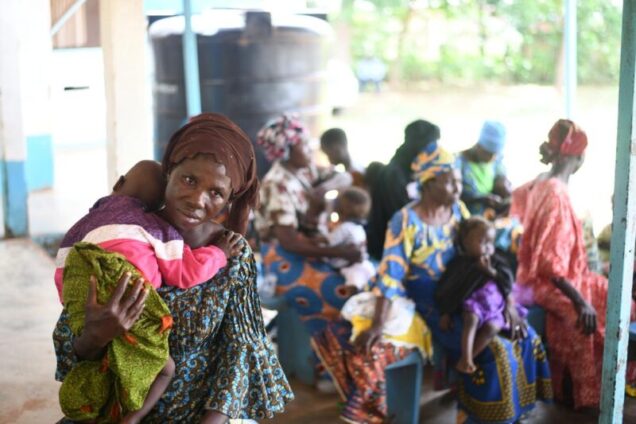Certain unhealthy traditional practices in the Karaga district of the Northern Region, along with other factors, are contributing to malnutrition among children.
According to health officers in the region, communal cooking practices and misconceptions about "spirit children" are among the key issues.
In a recent case, a mother nearly lost her child due to suspicions of him being a "spirit child". The timely intervention of community health officers saved the child. Per their custom, the community would have killed the child on the same suspicion.

In an interaction with JoyNews’ Emefa Atiamoah-Eli at the Karaga Health Centre, Salima, an over 30-year-old-looking mother of three, recounted her experience.
Her third child, Abdul, was diagnosed with malnutrition at 14 months following a visit by community health officers. Salima said, "they (community members) thought my child was a spirit child because he was so emaciated. I was afraid to even carry him as a mother.

Out of ignorance I also believed them when they labeled him a spirit child. But the community health officers told me it was malnutrition so I should take him to the Health Centre for treatment. Now he is has recovered’’.
Mary Adengiba, a nutrition officer at the Karaga Health Centre, explained apart from poverty and ignorance, communal cooking practice is a major contributor to child malnutrition in the area”.

“In that communal cooking, a woman cooks to feed a household of at least 20 people for two days in rotation. She bears the cost of the ingredients, and depending on her resources, she may cook with little to no protein. The same food is fed to the children, leading to malnutrition.”
Within six months, Abdul’s condition has improved after being enrolled in a nutritional program at the Karaga Health Centre. He was treated with ready-to-use food, such as "plumpy nuts" and other nutritional supplements provided by UNICEF and donor partners.

His mother expressed her gratitude, saying, "The supplements saved my son. I noticed he started gaining weight a few months after taking them. He is living proof of the intervention."
The Karaga District General Hospital attends to a number of severe cases.
Two-year-old Rauf Abubakar was admitted on arrival at the facility. The pale-looking and distressed infant, with swollen limbs, cries her pain continuously away while seated reluctantly on a not-so-warm and rickety hospital bed with her otherwise large head relaxing backward on her tiny neck.

Her mother, Lazina Abubakar, is five months pregnant with her third child and, like many others in the region, does not know her exact age.
The dietician attending to Rauf, Nicholas Ayese Aganeyeriba, said "Rauf is suffering from acute malnutrition with grade 3 edema, - this is a condition caused by lack of some essential nutrients such as protein and energy-giving foods like carbohydrates”.

Although the Northern Regional Health Directorate boasts of an increase in the recovery rate of malnourished children with no deaths since 2022, nutrition officer Mary Adengeba stresses that checking the inimical traditional practices will largely improve the outcomes of their interventions.
She noted "if that tradition doesn’t stop, in fact, there is nothing we can do about malnutrition - we can only try our best.’’
Organizations like UNICEF hope that local efforts will sustain the progress made through interventions and prevent the recurrence of malnutrition in the district.
Latest Stories
-
Asantehene assures Kumasi Zoo won’t be relocated
17 minutes -
Results from Ablekuma North rerun trickle in
23 minutes -
TECNO kicks off New Era with SPARK 40 Series and CAF Partnership
41 minutes -
Justice Blay apologizes for controversial comments on radio interview
1 hour -
Minority condemns violence, police inaction in Ablekuma North rerun
2 hours -
Ablekuma North rerun: Polls close, sorting and counting underway
2 hours -
“We neither sleep nor slumber,” says NPP’s Akua Afriyie as polls close in Ablekuma North rerun
2 hours -
GJA demands transparent probe over police officer’s assault on journalist at Ablekuma North
2 hours -
NPP Deputy Organiser Chris Asamoah beaten to pulp during Ablekuma North polls
2 hours -
Ablekuma North rerun: I don’t feel sorry for Hawa Koomson, she deserves it – Hannah Bissiw
2 hours -
Flush the Crisis: Why Ghana can’t wait until 2103 to Fix the Toilet crisis
2 hours -
Dr. Hanna Bissiw justifies attack on Hawa Koomson, says “violence begets violence”
2 hours -
GJA condemns assault on journalists during Ablekuma North rerun
3 hours -
Diana Hamilton celebrates God’s goodness in new single ‘Me Nyankopon Papabi’
3 hours -
Exposed: Face of thug who attacked JOYNEWS journalist at Ablekuma North rerun
3 hours

